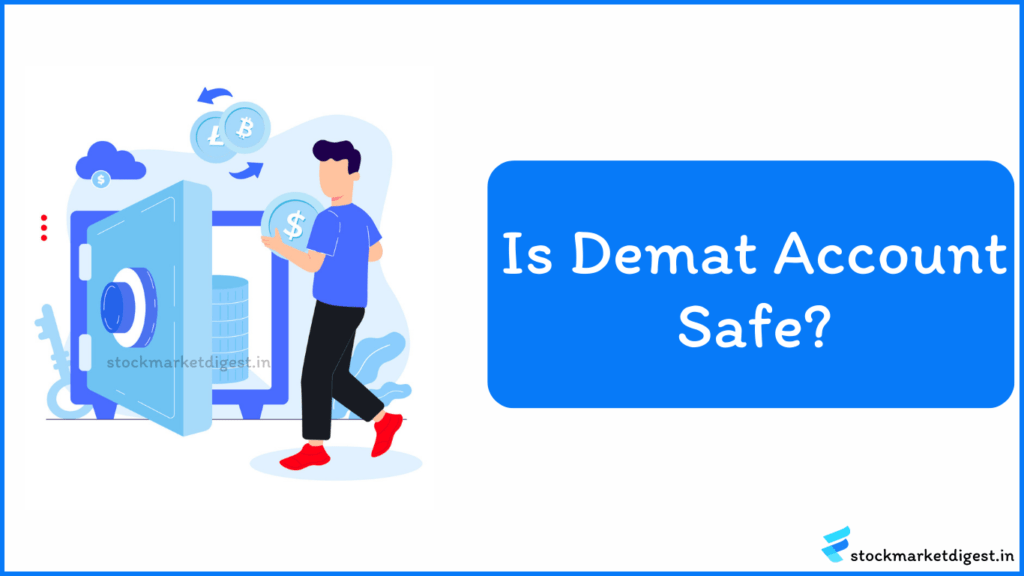In today’s fast-paced digital world, where financial transactions are increasingly conducted online, concerns about the safety of our accounts loom large.
This is especially true for Demat accounts, which play a important role in the Indian investment sector. Let’s look into the safety aspects of opening a Demat account online and explore what measures are in place to ensure the security of our investments.

Demat Accounts and Safety Measures
A Demat account, short for dematerialized account, is essentially a digital vault where investors can securely hold their securities such as stocks, bonds, and mutual funds.
It acts as a bridge between the physical world of paper securities and the electronic world of trading.
Key Features of Demat Accounts
When it comes to the safety of Demat accounts, several key features are in place to protect investors’ interests:
- Secure Trading Platforms: Reputable brokerage firms offer online platforms that are not only user-friendly but also equipped with advanced security measures to safeguard transactions.
- Compliance with Regulations: These firms operate under the watchful eye of SEBI, the regulatory authority overseeing India’s securities market. This ensures that they adhere to strict guidelines aimed at promoting transparency and protecting investors’ rights.
- Depository Participant (DP) Services: Entities like NSDL and CDSL act as intermediaries between investors and the stock market, providing secure storage and transfer of securities.
- Cybersecurity Protocols: In an age where cyber threats are ever-present, brokerage firms invest heavily in cybersecurity measures to fend off attacks and protect investors’ sensitive data.
- Authentication Mechanisms: Online account opening processes typically involve multi-factor authentication and rigorous verification procedures to prevent unauthorized access.
Also Read : Can a Demat Account be Opened without a PAN Card?
Safe Demat Account Providers in India
Let’s take a brief look at some of the most trusted Demat account providers in India and what sets them apart in terms of safety:
1. Zerodha
Known for its user-centric approach and innovative features, Zerodha has garnered a reputation for prioritizing the security and privacy of its users.
2. Upstox:
With a focus on reliability and trustworthiness, Upstox goes the extra mile to ensure that its users’ financial assets are well-protected against potential threats.
3. Angel One:
Committed to investor satisfaction, Angel One combines cutting-edge technology with robust security protocols to offer a seamless trading experience.
4. ICICI Direct:
Backed by the credibility of ICICI Bank, ICICI Direct is synonymous with trust and integrity, offering investors peace of mind in an ever-changing market landscape.
5. Kotak Securities:
With a strong emphasis on regulatory compliance and customer satisfaction, Kotak Securities stands out as a beacon of reliability in the realm of online trading.
Also Read : Mimimum Amount Required to Open a Demat Account
Conclusion
In conclusion, while there are inherent risks associated with any form of online activity, opening a Demat account can be a safe and rewarding experience provided you choose a reputable provider.
By opting for established names like Zerodha, Upstox, Angel One, ICICI Direct, or Kotak Securities, investors can rest assured knowing that their financial well-being is in good hands.
Check Out Below Informational Articles Related to Demat Account:
- Can a Person Have Multiple Demat Account in India? Is it Legal?
- Difference Between Demat and Trading Account
- What is Demat Account Holding Statement and How to Download it?
- How to Convert Shares in Physical Format to Demat Format
- Minimum Amount Required For Opening A Demat Account
- Understanding the Advantages and Disadvantages of Demat Accounts
- Demat Account Number Format : How To Find Your Demat Account Number?
- How to Open a Joint Demat Account – Benefits
- Basic Service Demat Account – Benefits & Drawbacks
- How to freeze and unfreeze your demat account
- Types of Demat Account in India
- How to Add a Nominee to Your Demat Account?
- How To Close Your Demat Account Online?
- When Are Bonus Shares Credited in Demat Account?
- Can a Demat Account Be Opened Without a PAN Card?









